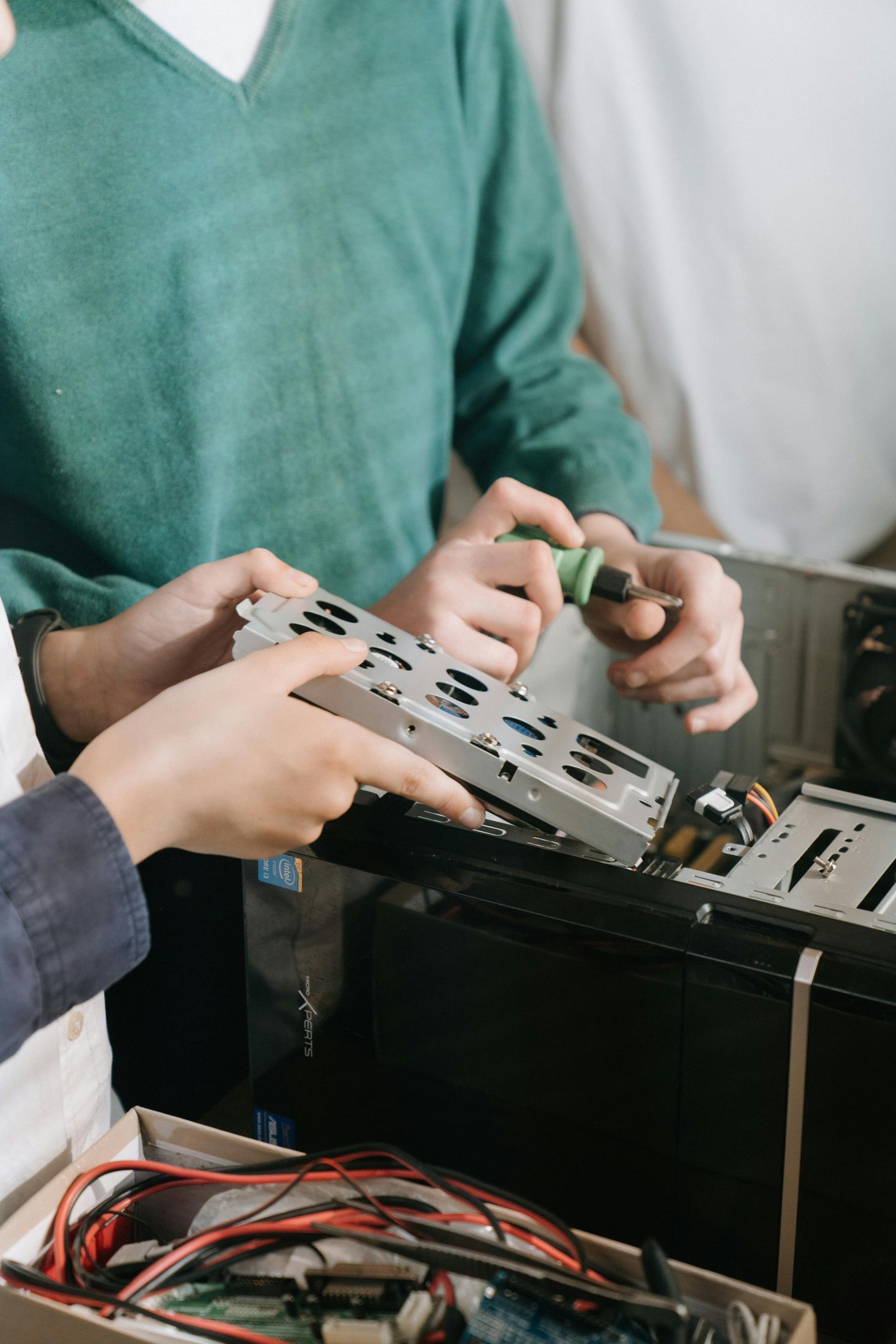Colocation Data Centres vs In-house Data Centres
Why IP House recommends colocation data centre services

Jamieson Lee Hill, October 9th, 2023
In this article we look at in-house data centres and how they compare with colocation data centres such as IP House, London. This is a deep dive into why we think colocation data centres services have the edge on in-house facilities.
What is an in-house data centre? (In-house DC)
An in-house data centre is when a company houses its servers, networking hardware, or other necessary IT equipment in its own onsite facility. The in-house DC is owned and managed by the company itself. In-house facilities are normally located on the company’s property or another place nearby owned by the company. Often companies hold onto their in-house data facilities for
…” mission-critical systems to account for the fact they can run out of space..”
Source:
Data Span.com, 2023
In-house DC facilities mean that a company has full control over data as well as security, cooling and airflow.
What are the advantages of an in-house data centre?
A primary advantage of an in-house data centre is that your company has total control over data with the freedom to expand capacity when needed. Equally, with the hardware and software stored on-site, it is easy to troubleshoot problems or carry out maintenance.
Large corporations and their executive boards had a tendency in the past to prefer data to be stored onsite. However, this is slowly changing as more corporations adopt colocation data centre services like IP House.
“One of the main advantages of an in-house data centre is complete control and companies are always in touch with their data and are free to change or expand on their own terms as they need it.”
Source:
Data Foundry.com
The downsides of In-house data centres
Nevertheless, housing your company onsite has certain disadvantages, mostly centring around resources. An in-house DC requires a lot of investment, human labour, and time for the maintenance and expansion of service. As your business scales, the complexity and resource demand of growth incur increased costs. There is also the question of getting employees with the right knowledge to maintain these services as it becomes harder to recruit staff with high-level and cutting-edge IT skills.
“More than half (53%) of the respondents to Uptime’s 2022 Global Data Center Survey report that their organizations are having difficulties finding qualified candidates — up from 47% in last year’s survey and 38% in 2018.”
Source: Journal Uptime Institute.com, 2023
This IT labour shortage is also seen in the cybersecurity sector with a shortage of staff of over 3 million,
“The 2022 (ISC)2 Cybersecurity Workforce Study identified a 3.4 million worldwide cybersecurity worker gap; the total existing workforce is estimated at 4.7 million.”
Source: Security Intelligence.com, Feb 3, 2023
Construction of an in-house DC costs a large initial investment for hardware, infrastructure and the building. Yet an in-house DC gives the firm the freedom to customise the design of the centre to meet their bespoke requirements as a company.
What is a colocation data centre? (Colocation DC)
A colocation data centre is where hardware and IT equipment are housed offsite in a secure third-party location. A colocation DC will normally house hardware and software for a number of companies in different sectors. IP House, London is a colocation DC which supports various sectors including fintech, gaming, and education.
What are the advantages of a colocation data centre?
Housing your data offsite in a colocation DC does put physical distance between your business HQ and your data. However, with 24-hour online access to your data and software, the distance is inconsequential. Due to changing attitudes to data storage, the colocation DC has seen significant growth in recent years with the industry expected to hit $54 billion in 2023.
Expertise and Knowledge
One of the main benefits of using a colocation DC is the 24/7 expertise that comes included with the package. IP House provides cutting-edge infrastructure and facilities with highly trained staff onsite to give you peace of mind that your data is in safe hands.
24-Hour Monitoring And Protection
With a colocation DC, your business data is protected by facility maintenance and 24-hour monitoring, against cyber attacks, power failures, and data breaches/hacking. This takes the pressure off your business in terms of resources and funding. It is the colocation DC which provides the staff, time, and resources to manage your systems.
Scalability
With a colocation DC, it is much easier to expand your business because of the flexibility of the colocation DC infrastructure. Depending on the sector, each industry has different needs. IP House’s leading-edge facilities will help your business scale rapidly while maintaining high standards for your clients.
Affordability
Affordability is another key reason to use colocation DC services. Rather than having a massive investment for an in-house data centre, a business can grow step by step. Colocation DCs allow a business the flexibility to scale and expand gradually or as quickly as needed.
“Colocation is often the less expensive option because having your company servers hosted in a shared facility can lead to lower energy, connectivity, and other utility costs.”
Source: Lightwavenetworks.com, 2023
Connectivity, Latency and Speed
Excellent connectivity and latency in colocation DCs mean that businesses have fast and reliable servers for their staff and clients. In the modern world, as data becomes more decentralised and speeds increase, colocation DCs are starting to replace in-house DCs in many cases. Colocation DCs tend to have a much higher and quicker bandwidth than in-house facilities.
Server Uptime
Colocation DCs provide businesses with the advantage of being guaranteed a certain % of the uptime. They do this by buying a specific ‘tier’ of the uptime. This comes without the salary expenses or maintenance
costs that an in-house facility would incur.
Risk management
If a natural disaster or power cut happens, a colocation DC like IP House will be able to keep your business services working so that network traffic is not affected. Layers of ‘redundancy’ at a colocation DC are much more complex than most in-house data centre facilities.
Security
Colocation DCS have the latest cutting security technology. This includes biometric readers, CCTV cameras, check-in desks and other security measures. 24/7 & 365 day a year security monitoring online and in the real world tackle cyber security issues for all of IP House’s clients.
“Colocation data centers typically offer fully redundant power and internet connections, mirrored data centers for reliable disaster recovery, and high-end physical security features like biometric screening included with their colocation lease agreements.”
Source: Lightwavenetworks.com, 2023
Cost savings of colocation data centres
One of the main advantages of colocation is that it results in significant cost savings especially when measured against managing a data center in-house. This helps businesses to make significant cost savings to stay on budget. Also, the ongoing maintenance of an in-house DC is much more expensive than outsourcing to a colocation data centre like IP House.
Certified Experts
Partnering with a colocation DC like IP House guarantees that your firm is working with certified experts. This results in significant savings over salaries that happen with an in-house facility. The experts who work for colocation DCs can troubleshoot, monitor and manage your business systems, saving your firm time and money.
Reflections
With a significant shortage in high-level, expert staff to work in data centres, IP House strongly recommends that companies go down the collocation DC route. Outsourcing your software, systems and data to IP House will give you peace of mind. Plus, your business will be able to scale and provide consistent services that are safe, reliable and fast.
Collocation data centres with shared facilities equate to lower costs for your business; as the cooling and power expenditure are covered by a multitude of customers, rather than paying for it all as with an in-house data facility. Furthermore, colocation DCs usually have a volume of usage that allows them to negotiate better price deals with internet providers to further lower costs for businesses.
Finally, the large bandwidth capacity of colocation data centres is often greater than that of in-house DCs. It is this bandwidth that is increasingly important for remote workers to ensure faster and more reliable online connections for apps, systems and data.
Find out more today by filling out the form below and then speaking to one of our experts at IP House.
Sources and Extended Reading List:
2. https://www.webwerks.in/blogs/what-choose-colocation-vs-house-data-centers
3. https://www.lightwavenetworks.com/resource-articles/colocation-vs-in-house-data-center/
4. https://cdpcorp.com/on-premise-data-center-vs-colocation/
5. https://www.tateinc.com/us/en/knowledge-articles/colocation-vs-in-house-data-centers/
6. https://www.bmc.com/blogs/data-center-colocation/
7. https://www.coresite.com/blog/choosing-a-data-center
8. https://www.datacenterknowledge.com/colocation/5-factors-consider-when-choosing-colocation-provider
9. https://www.sunbirddcim.com/blog/what-look-colocation-data-center
10. https://elementcritical.com/blog/how-to-choose-the-right-colocation-data-center-for-future-needs/
12. https://www.servercolocation.uk/blogs/news/how-to-choose-a-data-center-colocation-provider
13. https://colocation.yotta.com/blog/6-factors-to-consider-when-choosing-a-data-center











